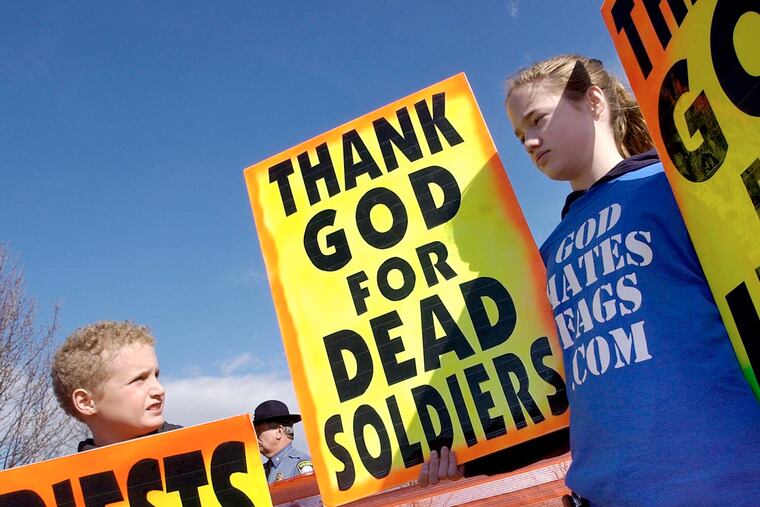Granddaughters of Westboro Baptist's founder recall fleeing the church
The night before Megan and Grace Phelps-Roper left the church that had meant everything to them, relative after relative streamed into their rooms, crying.

The night before Megan and Grace Phelps-Roper left the church that had meant everything to them, relative after relative streamed into their rooms, crying.
Megan Phelps-Roper was trying to pack when a beloved cousin walked in, stone-faced, and told her she was going to hell.
The Kansas sisters, in their 20s, wondered if they had made the right decision, if they were even sane. But after four months of questioning the Westboro Baptist Church - the provocative religious community known for staging antigay demonstrations at military funerals and other sites - they knew the only way to go was out.
The sisters, granddaughters of the church's founder, spoke Tuesday morning at the Anti-Defamation League's ninth annual Youth Leadership Conference held at the University of Pennsylvania.
They told 450 high school students and educators from around the region about the decision they made three years ago to leave behind a community famous for its extremism.
Megan Phelps-Roper, now 29, said she had vivid memories of participating in Westboro Baptist Church pickets at age 5. She, along with the other members of her family and the Westboro church community, would clutch signs denouncing homosexuals and Jews across the country. At their high school, she and her sister would wave placards at lunchtime.
"It was my whole life," Phelps-Roper said.
In 2009, Phelps-Roper began to use Twitter to spread Westboro's message. She struck up a conversation with a Jewish blogger named David Abitbol - originally by tweeting at him that "God hates Jews."
Their conversation moved from anger to intellectual discourse. Abitbol asked her about a picket sign that advocated the death penalty for gay people. Wasn't that hypocritical, he asked, since the church wouldn't condemn a congregant who had given birth out of wedlock?
For the first time in her life, Phelps-Roper felt that the church was fallible.
"Imagine everything you believe about the world is wrong - and, suddenly, you realize that," she told the audience. "When you think that your beliefs come directly from God - and, now, you have to figure out for yourself what is right and what is wrong and what you believe. The whole world was unstable. It was like a constant earthquake."
She shared her doubts with her younger sister, Grace. On a freezing November night in 2012, they finally left the church and their home.
Since then, the women said, they have tried reaching out to their family, both in person and online. A few years ago, Grace Phelps-Roper tried to drop off a birthday cake they had made for their younger sister. Their mother locked the door and refused to let them in.
"They don't want to think about us," Megan Phelps-Roper said.
The women said they hope to undo the damage they caused when they were younger by speaking about their experiences.
"We've been searching for a way forward, a way to help the people we spent so many years hurting, a way to fight prejudices we helped foment," Megan Phelps-Roper said.
Nancy Baron-Baer, regional director for the Anti-Defamation League, said she believed the sisters' story had the power to inspire young people.
"They show there's hope for all of us," she said. "There's hope for humankind."
After listening to the Phelps-Ropers, the high school students broke into groups to discuss diversity and their own backgrounds.
"Being here was an eye-opening experience . . . ," said Yamaira Crissey-Cartagena, a student at Esperanza Academy Charter School. "It was amazing."
kblum@phillynews.com @danilyst